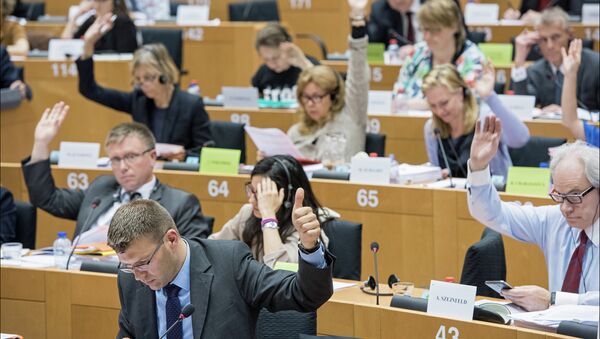MEPs are meeting in Strasbourg to try and thrash out a compromise over the TTIP ahead of a vote on its progress on Wednesday. At stake is the ability of the EU and its member states to maintain control over the regulation of food and medical safety, as well as other areas of trade that protect the health and well-being of its citizens.
At issue are the different regulatory regimes of the US and the EU, with many MEPs believing health, environment and food safety regulations are tighter in Europe than they are in the US. For example, in the US, children can drink fruit juices made with Red Dye 40 and eat macaroni and cheese colored with Yellow Dye 5 and 6, which are banned in the UK and must carry warnings in the rest of the EU.
Under the terms of the proposed transatlantic trade deal between the US and the EU, which would open up their markets in the biggest trade agreements in the world, there is a controversial proposal for an investor-state dispute settlement (ISDS) mechanism, which would allow companies to sue governments if their regulations or laws affected corporate profits.
New to #TTIP? Want to know what it is? See our Questions & Answers on it in 23 European languages: http://t.co/P3RnaTsBem #EPonTTIP
— EU TTIP Team (@EU_TTIP_team) July 7, 2015
Confusion on Votes and Replacement Court
In June, MEPs twice failed to vote the ISDS through and tabled over 100 amendments, sending the proposal back to the Trade Committee to try and reach a compromise.
However, the committee re-tabled the June plenary amendments for this week’s session – in defect, bouncing it all back to the main parliament.
Open letter to #MEPs signed by 480 NGOs ahead of Wednesday's vote on the #TTIP resolution: http://t.co/TM34zyIeZt pic.twitter.com/Os9YpdDYED
— Stop TTIP (@eci_ttip) July 6, 2015
In a baffling piece of Eurospeak, the committee decided to put the matter to "two separate votes –one to re-table the plenary amendments, and the other to re-table requests for split or separate votes."
In a further twist, Bernd Lange, chair of the international trade committee told the European Parliament’s news service that is would replace the proposed ISDS with a new system of dispute resolution, although it is unclear how it would work.
"Last time it was clear that ISDS is dead, that private arbitration is an instrument of the past and it is not foreseen by the Parliament anymore as an alternative in trade agreements," he said.
"Now it is clear that ISDS has to be replaced by a public court. We need publicly appointed judges, we need a clear European mechanism, and we need a public codex of the court. So it is a completely new system."
With the committee bouncing the amendments back to the parliament for two separate votes and the proposal for a new court of arbitration – in addition to the various legal entities already in existence – it is unclear how far the TTIP will progress this session.




